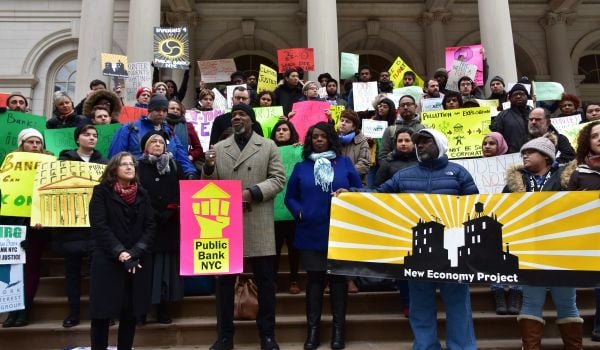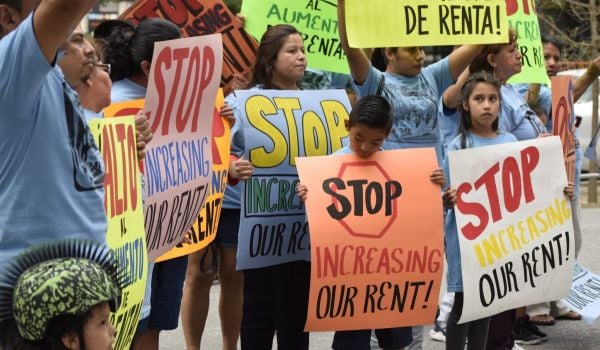New York is now the first city in the United States with a line item in its budget specifically for the development and cultivation of worker cooperatives.
Designed to be a tool of economic democracy, the worker co-op model allows employee-members of a business to elect its board of directors on the basis of one employee, one vote. In most instances, the businesses opt to distribute profits equitably among the employee-members. The worker cooperative model is relatively rare in the U.S. The U.S. Federation of Worker Cooperatives estimates there are around 350 in the nation, with many concentrated in the Bay Area, the New York metropolitan region and New England. In some Latin American and European nations, worker cooperatives are more common, the most famous example being the Mondragon Cooperative in Spain’s Basque region.
New York City Council’s budgeted $1.2 million is meant to support the expansion of 20 existing worker co-ops, the creation of 28 new ones, and 234 new jobs. Prior to this specific line item, the city had provided small amounts of funding to worker co-op incubator Center for Family Life — $150,000 a year since 2011. The expansion of funding can be attributed, in part, to the left-wing sweep of last year’s city elections (which resulted in a greatly enlarged Progressive Caucus on council and, more famously the victory of Bill de Blasio). But a year before that, the venerable Federation of Protestant Welfare Agencies, a coalition of social service groups, opened talks with New York City Network of Worker Cooperative because of their repeated experience with the limitations of traditional workplace development training.
Abby Scher, who details the history of the council’s decision here, quotes advocates who argue that worker cooperatives are a policy response to unemployment and, even more pressing, the ever-increasing numbers of poverty-wage jobs (especially for those without college degrees). The imperative to tame the low-wage economy is especially pressing in New York City, where rents are infamously high.
“We are talking about creating an economy in New York City that protects and preserves jobs and a democratic economy that sees making sure people have jobs as one of its goals,” says Chris Michael, founding director of the NYC Network of Worker Cooperatives. “[Workers’ cooperatives] provide the members with dignity, better working conditions, more flexible working hours, and higher wages. Investors don’t care about any of this. By definition investors care about seeking profit and return on their investments.”
But changing the political economy of the finance capital of the world is a fairly tall order, especially with such a miniscule amount of money. The allotted $1.2 million represents the merest sliver of the metropolis’ $75 billion budget. But worker co-op advocates are quick to point out that the New York City Council’s decision still represents the largest sum an American political body has ever granted to business development in their sector.
The city is doing a couple other things to encourage the sector’s growth. The Department of Small Business Services recently reintroduced a class on the formation and maintenance of worker cooperatives, and it is expected that a bill will soon be introduced to institute a requirement that city agencies study and report the proportion of goods and services they purchase from worker cooperatives. Michael also hopes to see policies introduced that would grant preferential treatment to worker cooperatives and other forms of democratic business in the contracting process.
Even with the council funding and assuming continued positive legislative outcomes, the movement is very much in its infancy and far from the ambitious, economy-altering dreams of its proponents. “It would go a long way to eradicating unemployment,” one councilwoman says in Scher’s piece — but there are currently only 40 worker cooperatives in a city with 944,129 firms (by last Census count).
“Worker cooperatives exist in the market economy and as long as it remains relatively unregulated, there is very little an individual worker cooperative business can do to transform wages,” says Michael. “Mondragon has actually weathered the crisis more successfully than most other businesses in Europe, because the businesses are controlled by their employees and employees value their jobs, and their friends jobs. … In order to transform wages and salaries it has to be system-wide, or market wide, either through political regulations or through political muscle that comes with unionizing the workforce. Or through the muscle that comes from building worker cooperatives across an entire sector.”
That’s a long way off. But the fundamentals of the economic moment are conspiring to make the worker cooperative movement look very good. “Corporate profits are at their highest level in at least 85 years,” the New York Times reported in April. “Employee compensation is at the lowest level in 65 years.” The New America Foundation released a study yesterday that found that 56 percent of jobs created in 2014 thus far only offer an average weekly gross pay of $614, while the amount of reported stolen wages far outstripped the money lost to brute robbery in 2012. It is believed that most wage theft goes unreported.
Workers cooperatives, even if limited to a single firm, promise to be an alternative to these grim numbers. New York City is taking a short step toward ensuring a few Americans get the opportunity to try something else.
The Equity Factor is made possible with the support of the Surdna Foundation.


















